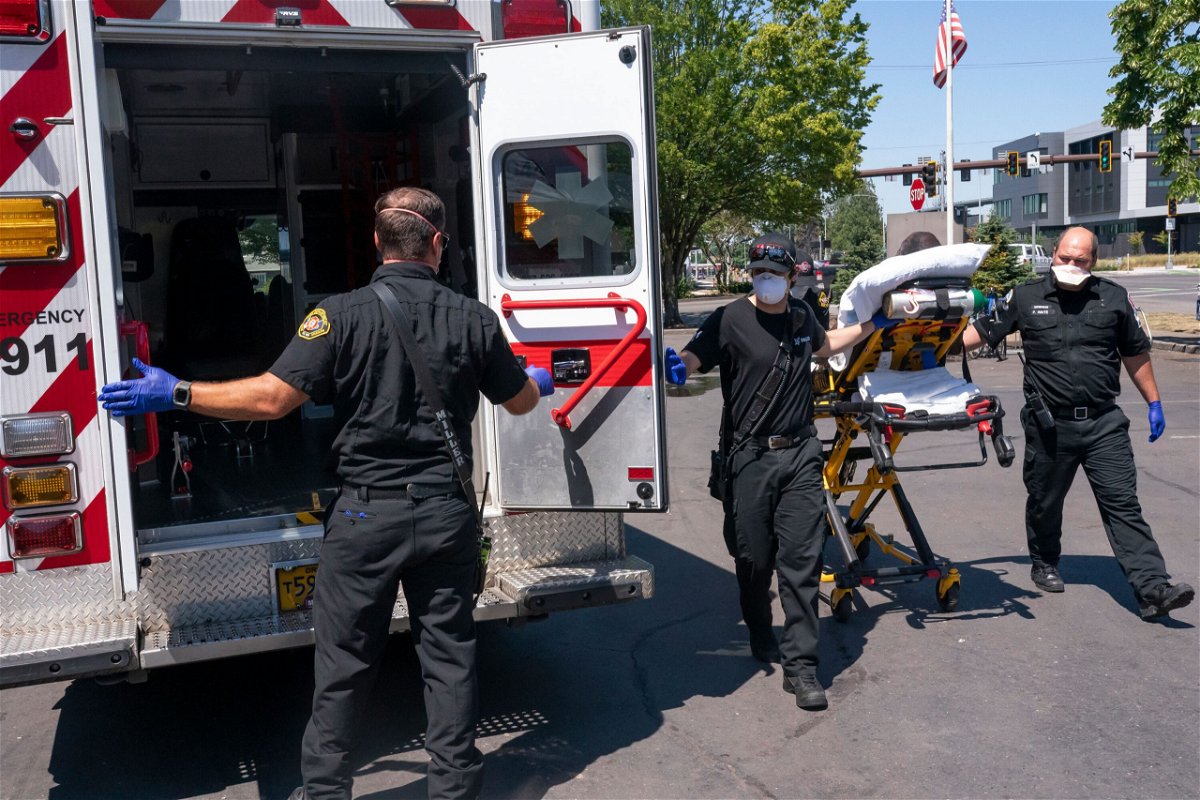Climate change is fueling mass-casualty heat waves. Here’s why experts say we don’t view them as crises

Salem Fire Department paramedics and employees of Falck Northwest ambulances respond to a heat exposure call during a heat wave on June 26 in Salem
By Rachel Ramirez, CNN
The Pacific Northwest heat wave in late June was a mass casualty event, officials said. Hundreds of people likely died in the multi-day, record-breaking heat, and the death toll continues to rise.
Officials are still investigating the cause of dozens of deaths that occurred during that time, but at least 83 people died from heat-related illness in Oregon, 54 of which were in Multnomah County, which includes Portland. Many of those people were older, living alone, and without functioning air conditioning, according to a a preliminary report on excessive heat deaths released by the county Tuesday.
In Washington, at least 78 people died. Across the border in British Columbia, officials counted nearly 800 deaths from June 25 to July 1 — 500 more than normal for that time period and which they believe are tied to the heat, according to Lisa Lapointe, the chief coroner for the province. In reality, it could be months before we know the final toll.
Despite the staggering statistics, there was no obvious sense of urgency around the tragedy as it played out — nothing similar to a hurricane making landfall, a gunman opening fire in a night club or a wildfire destroying a town. They were hundreds of quiet deaths from an invisible disaster: unprecedented heat, which dozens of scientists concluded was “virtually impossible” without climate change.
Scientists and psychologists told CNN the response has to do with how humans view crises.
“When there’s a wildfire or hurricane, it’s easy for people to see the devastation in front of their eyes,” said Aaron Bernstein, the interim director for the Center for Climate, Health and the Global Environment at Harvard T.H. Chan School of Public Health. “Our brains are highly tuned to pictures of destruction, because we don’t want that to happen to us. With heat waves, there usually isn’t a visible swath of destruction.”
The heat wave also occurred against the backdrop of another deadly tragedy: a condo collapse in Surfside, Florida. As of Monday, 94 people have been declared dead, with 22 more unaccounted for. The heat wave began the day after the collapse, but only one of those events truly gripped the nation’s attention.
Bernstein noted that the public response to a tragedy has to do partly with who is responsible. People want someone to blame, he said, and in tangible disasters it’s easy to point a finger — in the case of the Surfside collapse, a landlord or engineer.
But it’s different with a global crisis like climate change, which doesn’t kill people directly but instead makes it more likely that an event will be deadly.
“There’s no single person that you can point a finger to on climate change,” Bernstein said. “Our brains are much more likely to pay attention when there’s a person to point a finger at. There are other reasons, but all of those reasons make very clear to me that we have to make climate change personal, actionable and urgent.”
Humans also tend to connect more with short-term tragedies than events that seem far-off, as climate change might feel, according to Astrid Caldas, a senior climate scientist at the Union of Concerned Scientists.
“We cannot really compare the tragedies and the events, because they are separate and both were terrible events,” Caldas told CNN. “But there are all these complex constructs of people’s psyches and how media behavior contributes to that lack of same reaction.”
Such responses to climate change-fueled disasters and the harm it’s causing for people is not that dissimilar to people’s reactions toward the Covid-19 pandemic as the Delta variant spreads rapidly, according to Kristie Ebi, a climate and health researcher at the University of Washington.
“Over 600,000 Americans died (of Covid-19), and yet there was a limited response in many quarters,” Ebi told CNN. “When we look at heat waves, we often don’t get the total number of deaths until months later,” which are often much higher than initial estimates.
Much like the pandemic, extreme heat also disproportionately kills low-income communities, people of color and the elderly populations. As of Monday, Oregon health authorities report about two-thirds of heat wave deaths were people of color.
A 2020 analysis found that the number of heat-related deaths in the US each year has been underestimated since records typically only look at medical terms such as heat stroke, and neglects other potentially heat-related causes of death, like heart attacks and other underlying conditions.
Ebi said most people, particularly in a typically mild region like the Pacific Northwest, don’t perceive heat as a health risk.
“People are generally unaware and don’t think about the risks associated with these high temperatures,” she said. “There’s been a number of efforts to try and increase that awareness, and yet, there’s almost no research to back up what’s an effective approach.”
Researchers say it’s important to understand that climate change is already affecting our lives today — that unless climate resiliency or heat action plans are put in place, particularly in historically marginalized communities, multiple people will suffer and die from extreme heat as climate change accelerates.
“If nothing is done, and people continue to be vulnerable, I would say, by logic, the number of people affected would go up,” Caldas said. “We need to have an idea of what could happen if we don’t act. It’s about trying to prevent what can happen, if we don’t take any action.”
The-CNN-Wire
™ & © 2021 Cable News Network, Inc., a WarnerMedia Company. All rights reserved.
CNN’s Brisa Colon and Chris Boyette contributed to this report.